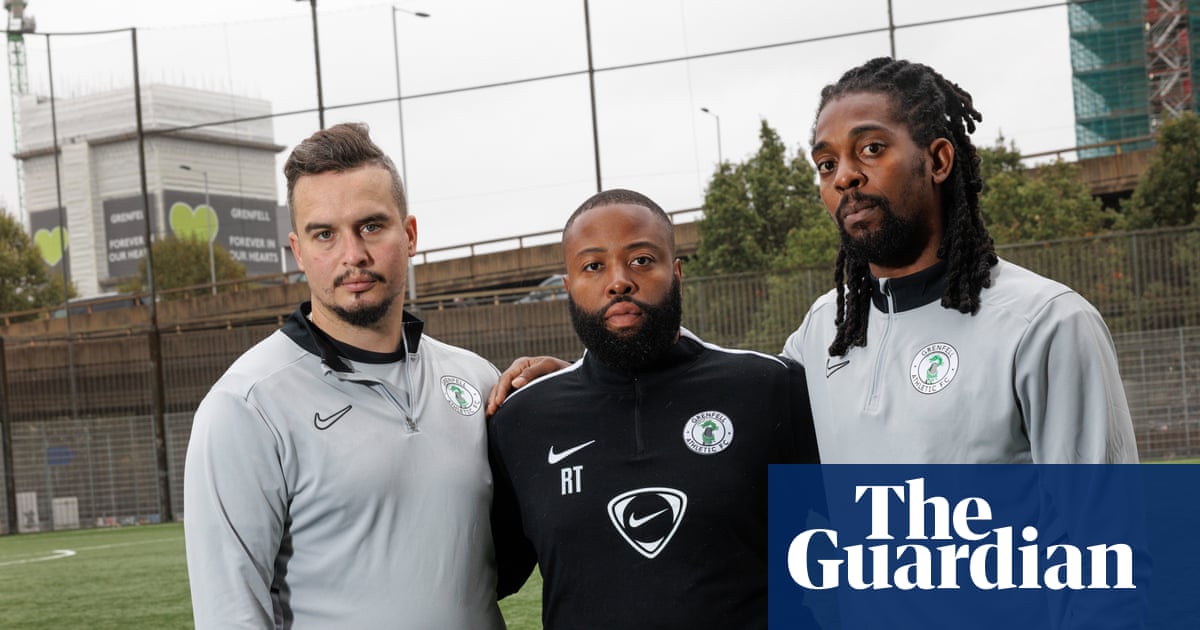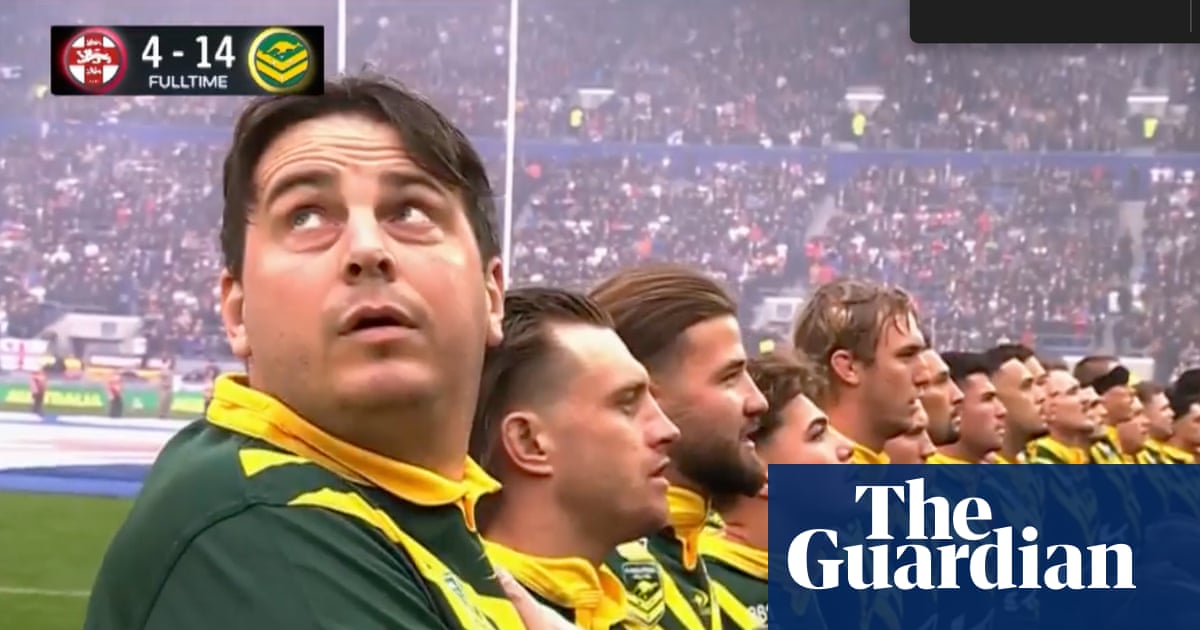‘They saved my life’: Grenfell Athletic create hopeful future despite pain of loss in tower fire

Every weekend they arrive with their boots and their grief, their studs and their memories of the Grenfell Tower fire which changed their lives for ever and killed 72 people. But the Grenfell Athletic football players, in two men’s teams and a women’s side, also bring hope, pride and even joy as they climb up their Saturday afternoon and Sunday morning amateur league tables with growing conviction that their club is a rising force.Grenfell Athletic were founded by Rupert Taylor, a community leader and local inspiration, and Paul Menacer, who was asleep in the tower on the night of 14 June 2017 when the building turned into a blazing inferno. Together, they started a football club to help their community cope with the devastating loss.For Taylor, who runs the club and manages the Sunday men’s team, it was “like living in a different world” in the aftermath and “nothing like where I grew up. There was a lot of sadness and darkness in the air.” The 39-year-old pauses while he searches for the right words to describe how the community around Grenfell changed.“Loss was in the air,” Taylor says. “We had people that were instantly grieving. And with that grief came panic, anxiety and anger. Multiple emotions were in the air. For a week or two it was chaos. We didn’t know who was still alive, who was in hospital from smoke inhalation or injuries. While we were waiting some people would speak to the other residents who would then speak to you. So you would work out who was still missing. They hadn’t responded and that’s the way we found out [who had died].“It was a very dark time. You could smell smoke in the air and still see debris floating by. So we tried to find togetherness and the community did its best to pull together under tragic circumstances. It was very challenging.”Taylor grew up a few streets away from Grenfell and, at a nearby youth club, he was a mentor to a number of boys and young men who were burned alive. While witnessing the smouldering wreckage of people’s lives, Taylor met Menacer for the first time. In Theo Lee Ray’s moving and ultimately uplifting new documentary about the fire and football, Menacer remembers how, having woken to “the sound of people screaming”, he escaped his flat and “one of the firefighters said: ‘Run … run for your life!’ I ran all the way up the road, cladding was falling right in front of me. I looked over my left shoulder and the whole building was alight.”Ray’s documentary captures the terrifying moments, recalled by survivors, when “people were tying up sheets, trying to escape … [from] a red inferno in every flat, yellow flames shooting up into the air against a black sky”.Menacer was haunted by all he had seen and, in his vulnerability, he opened up to Taylor who tells me: “I was working within the community and I met Paul who was a survivor. I befriended him and tried to support him because he lived in the tower with his uncle and he didn’t have much left in a chaotic time. Paul described losing his parents when he was a teenager as the other sustained period of pain in his life. I asked him what got him through such a difficult time and he said: ‘Football.’”Taylor smiles. “So I said: ‘We’ll create a football team then. Let’s just do it. If he’d told me table tennis had helped him I would have said: ‘We’ll do table tennis tournaments.’ If he’d said to me it was Formula One I would have said: ‘I may not be able to get you straight to an F1 track, but we’ll put you in a car.’ Whatever I could do to help and support him, I would do. The team was formed five weeks after the tragedy.”The 32-year-old Menacer is the manager of Grenfell Athletic’s Saturday team and, as the documentary shows, he is still battling with his mental health eight years on. “In the years after the fire I was in a bad way,” Menacer says. “I was suffering very badly with insomnia and very bad PTSD. Survivor’s guilt hits home, thinking: ‘Why didn’t I knock on more doors upstairs, instead of going downstairs?’ You still believe you should have done more. Some of the young kids had their whole lives ahead of them, and they’re dying at six years old [and younger]. It hurts a lot. I can say it openly now that I suffer with my mental health. A few years ago I would have been shy and not tell people I’m suffering.”Yet last season Menacer’s Saturday team won their Surrey South Eastern league – and Grenfell Athletic’s first trophy. In his team talk before the crucial final match against Worcester Park, which Grenfell won 5-2, Menacer spoke emotionally of “the 72 – that’s who we are playing for. Let’s never forget why this team was formed. We should always have that in our hearts.”Taylor brought more silverware to the club when, soon after, his Sunday team won the final of the Greg Ward Cup against Brentford Town. Reflecting on their 2-0 win Taylor says: “A club born through tragedy that becomes triumphant is nothing short of incredible.”But winning trophies matters little when set against the positive impact the club has had on salvaging the lives of so many people. Joseph John, another survivor of the fire who plays for both teams, says: “The aftermath was harder than the actual night. Severe depression, anxiety. I was really in a bad place. I was suicidal at that stage and then joining the football club changed my life.“It shifted the mental side so I don’t feel alone. I was welcomed with warm hugs. I was embraced with a lot of joy. I felt like I was at home.”John, who is 34, says simply: “They saved my life.” His son Malachi plays for the club’s youth team and John stresses that “I’m in it for ever.”Taylor says they have 75 senior players and 55 juniors – who play in five teams from the under-nines to under-14s. The women’s team, nurtured by Taylor, also emerged with hugely positive consequences. “It started off in 2021 when we put on a Grenfell Athletic women’s kickabout together,” Taylor says. “We said to the women: ‘Come, play football, enjoy.’ We ran it as a training session and it was consistent and the girls were enjoying it and before Christmas 2021 I said to myself that if this continues and the numbers are still strong in the new year then maybe I’ll ask them if they want to start an 11-a-side team. I said: ‘We’re thinking about a team. There’re 15 of you turning up every week for training so do you fancy it?’ They said yes and that’s how the women’s team was formed.”Last month, work began to take down the tower. Many members of the Grenfell community fear that the corporate greed and negligence of those in positions of power will be forgotten. A “clear skyline and a forgotten scandal” could become synonymous and, for Menacer, the slow destruction of the tower “hit me pretty hard”. He says: “The tower coming down makes the club even more important.”Taylor prefers to avoid discussing the political ramifications of the tower’s removal from the streets of west London: “Obviously I have a political opinion but that’s not what Grenfell Athletic is or what it will ever stand for. Grenfell Athletic is about the future and it’s about hope. I never want to blur those lines.”Last season Grenfell Athletic women came close to winning their league and, in a new campaign, all three senior teams are flourishing. Tia Best, who plays for the women’s side, underlines the wider ethos: “The bigger the club gets, the more people speak about the name, the less people can ever forget about that night. We will carry on wearing the tower on our football kits and keep representing the people who didn’t make it.”Taylor believes that “Grenfell Athletic will be alive long after I’m gone. We’re putting down the foundations, and getting the infrastructure in place, to ensure I can pass the baton on at some stage because Grenfell Athletic is a legacy project and a monument to the 72 people that sadly lost their lives.”Every weekend, Taylor stresses, the club’s admirable footballers are “playing for a legacy. We’re still asking people to come on this journey with us because Grenfell Athletic is a movement. It isn’t a moment in time. This isn’t going anywhere. It’s moving forward because people believe in Grenfell Athletic.”Beacon of Hope: The Grenfell Athletic Story is a TNT Sports Original documentary on TNT Sports and discovery+In the UK, the charity Mind is available on 0300 123 3393 and Childline on 0800 1111. In the US, call or text Mental Health America at 988 or chat 988lifeline.org. In Australia, support is available at Beyond Blue on 1300 22 4636, Lifeline on 13 11 14, and at MensLine on 1300 789 978









